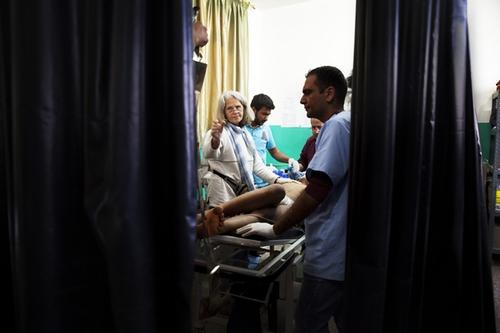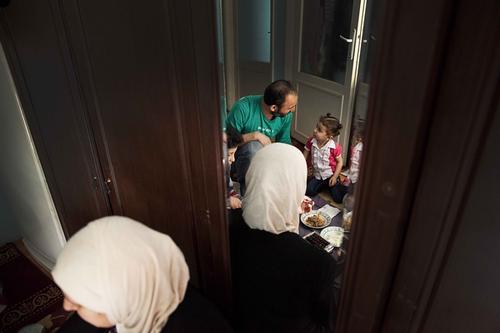This is the first chapter of the Syrian Exodus, an MSF multimedia project to follow the route of Syrians fleeing the war. See chapter two and three.
Yahya Okla is fingering his rosary beads. Sitting on a small mattress in the living room of his shared flat, he sips tea served by his flatmates and ponders all he has been going through in the past year.
“We don't talk about our feelings, because no words can express them,” he says.“We started to feel that this fear is like an illness, a physical condition. You feel it inside you, overwhelming you. It's actually inside your body, like an illness.”
With a haunting gaze, Yahya lights up another cigarette. He is not in Syria anymore, but in the south of Turkey. The 48-year-old describes the dangers faced by his family in the last months and his words travel once and again back to Syria.
“We can’t get rid of this fear, because when we hear the sound of a plane, our minds go back in time,” he says. “It’s not easy to overcome it.”
The Syrian crisis has forced over 2.2 million people to flee the country. In Turkey there are more than 600,000 refugees, according to the authorities. Most of them live outside the camps set up along the border. Yahya is living temporarily in Kahramanmaraş, a town in southern Turkey where he works as a construction worker, while his family are still staying in a refugee camp in Kilis, around 150 km away.
“The situation is much better here than in Syria,” he says, showing signs of relief. “At least it’s a safe place, there are no air strikes.”
We can’t get rid of this fear, because when we hear the sound of a plane, our minds go back in time,” he says. “It’s not easy to overcome.Yahya, Refugee
MSF is running six hospitals in northern Syria. In neighboring Turkey, the humanitarian organization is supporting, in collaboration with the local NGO Helsinki Citizens’ Assembly (HCA), a clinic with an average of 170 monthly consultations and a mental health project for Syrian refugees in the city of Kilis.
Yahya has left behind war and destruction, but now the reality of being a refugee is emerging – a scenario where his economic future is uncertain and a different language is spoken. In exile, Yahya has kept a rosary and a pair of trousers: the ones he was wearing when air strikes wiped out his neighbourhood while he was painting a door in his house in the outskirts of Aleppo, the main city in northern Syria.
“The house was destroyed. They killed the people who stayed,” he remembers. “When they found the bodies they couldn’t even bury them.”
That was the beginning of his flight. The family carried their light baggage through villages in rural areas of Aleppo province, until they reached a transit camp sheltering over 10,000 internally displaced persons (IDPs) on the border between Syria and Turkey, not very far from one of the hospitals run by Médecins Sans Frontières (MSF) in northern Syria. But not even these camps are respected in a conflict in which civilians are not spared from violence.
“A missile landed seven metres away from our tent, but it didn’t go off,” he sighs. “The kids were terrified.”
It didn’t take him long to run away from Syria. “My dream is not Turkey or staying in a camp, but living in my own house, in my country,” he insisted while still in the IDP camp. Five months later, he left behind the tent and is now living in a small flat in southern Turkey. He feels much safer, but keeps pronouncing the word dream, because going back home seems more and more unlikely as time goes by.





